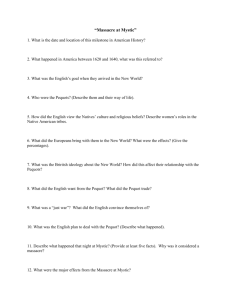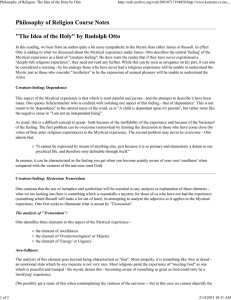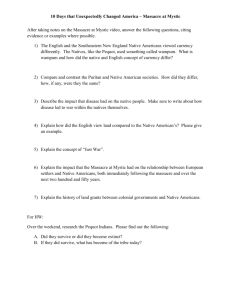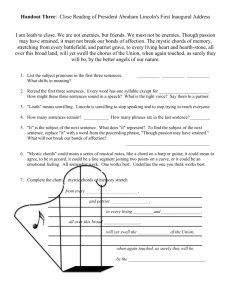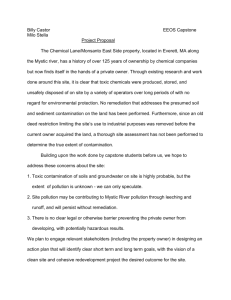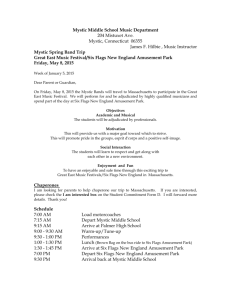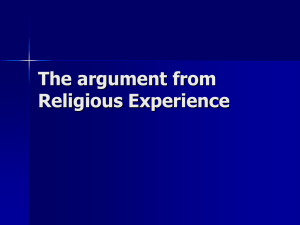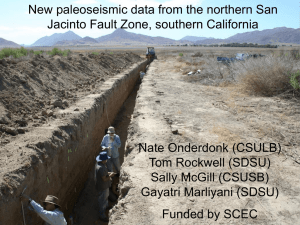Philosophy of Religion Course Notes
advertisement
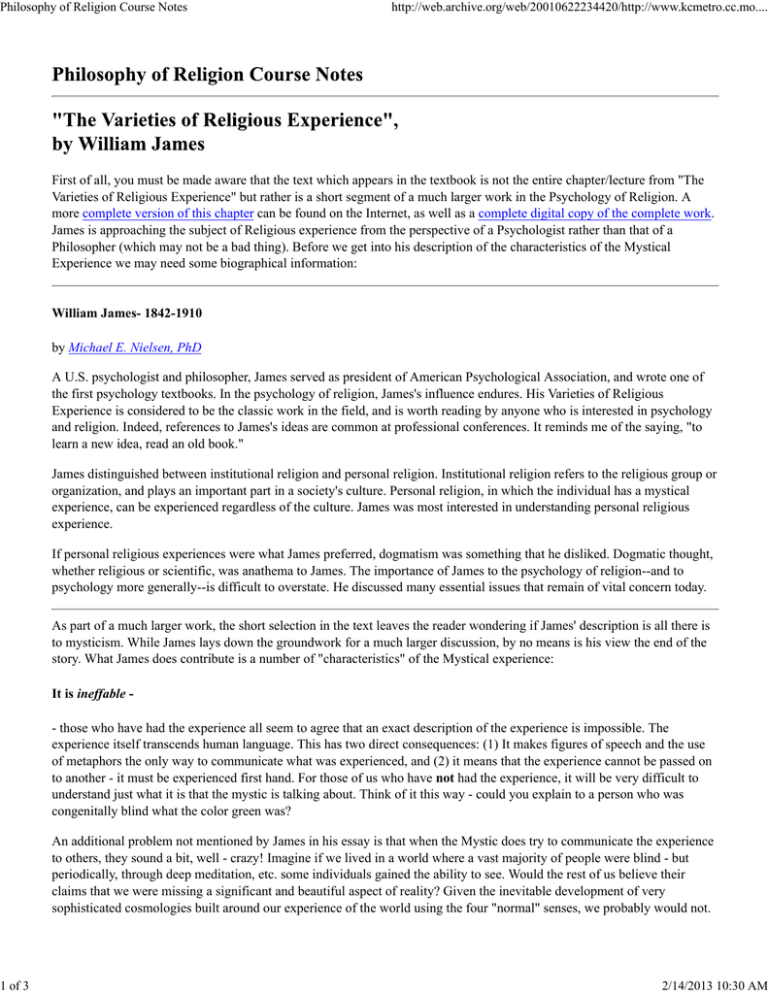
Philosophy of Religion Course Notes 1 of 3 http://web.archive.org/web/20010622234420/http://www.kcmetro.cc.mo.... First of all, you must be made aware that the text which appears in the textbook is not the entire chapter/lecture from "The Varieties of Religious Experience" but rather is a short segment of a much larger work in the Psychology of Religion. A more complete version of this chapter can be found on the Internet, as well as a complete digital copy of the complete work. James is approaching the subject of Religious experience from the perspective of a Psychologist rather than that of a Philosopher (which may not be a bad thing). Before we get into his description of the characteristics of the Mystical Experience we may need some biographical information: William James- 1842-1910 by Michael E. Nielsen, PhD A U.S. psychologist and philosopher, James served as president of American Psychological Association, and wrote one of the first psychology textbooks. In the psychology of religion, James's influence endures. His Varieties of Religious Experience is considered to be the classic work in the field, and is worth reading by anyone who is interested in psychology and religion. Indeed, references to James's ideas are common at professional conferences. It reminds me of the saying, "to learn a new idea, read an old book." James distinguished between institutional religion and personal religion. Institutional religion refers to the religious group or organization, and plays an important part in a society's culture. Personal religion, in which the individual has a mystical experience, can be experienced regardless of the culture. James was most interested in understanding personal religious experience. If personal religious experiences were what James preferred, dogmatism was something that he disliked. Dogmatic thought, whether religious or scientific, was anathema to James. The importance of James to the psychology of religion--and to psychology more generally--is difficult to overstate. He discussed many essential issues that remain of vital concern today. As part of a much larger work, the short selection in the text leaves the reader wondering if James' description is all there is to mysticism. While James lays down the groundwork for a much larger discussion, by no means is his view the end of the story. What James does contribute is a number of "characteristics" of the Mystical experience: It is ineffable - those who have had the experience all seem to agree that an exact description of the experience is impossible. The experience itself transcends human language. This has two direct consequences: (1) It makes figures of speech and the use of metaphors the only way to communicate what was experienced, and (2) it means that the experience cannot be passed on to another - it must be experienced first hand. For those of us who have not had the experience, it will be very difficult to understand just what it is that the mystic is talking about. Think of it this way - could you explain to a person who was congenitally blind what the color green was? An additional problem not mentioned by James in his essay is that when the Mystic does try to communicate the experience to others, they sound a bit, well - crazy! Imagine if we lived in a world where a vast majority of people were blind - but periodically, through deep meditation, etc. some individuals gained the ability to see. Would the rest of us believe their claims that we were missing a significant and beautiful aspect of reality? Given the inevitable development of very sophisticated cosmologies built around our experience of the world using the four "normal" senses, we probably would not. 2/14/2013 10:30 AM Philosophy of Religion Course Notes 2 of 3 http://web.archive.org/web/20010622234420/http://www.kcmetro.cc.mo.... The experience of the divine has a Noetic Quality The Mystic has not just had a special kind of perceptual experience, they claim to have had revealed to them a kind of special knowledge of the Divine reality. While those of us who have not had the experience might not accept the veracity of it, for the Mystic there is no doubt as to what the experience was of. In this way, we could say of the experience that it was perceptual in nature, though not sensory. Perceptual in that it could not be doubted that X was experienced, sensory in that we can doubt that there was any such X to be experienced. The experience is Transitory Though this aspect is less important than the first two, it is nonetheless significant. The Mystic seems unable to sustain the experience of the Divine for any great length of time. This may be due to a number of factors which James does not go into here. The transiency of the experience may be due to the intensity of it - different religious traditions have attempted to explain this in terms of electrical flow - a wire of a given thickness can withstand a short pulse of high voltage without burning out, but a longer burst of the same voltage would melt the wire in two - making it useless as a means of transmitting electricity. By the same token, extended exposure to the Divine may result in a "blown fuse" in a human. Another possible explanation is that awareness of the Divine may be more of a realization of what was already known or present, rather than a discovery of what was previously hidden. What may be necessary for our realization is to eliminate all of the "stuff" which distracts us from "seeing" what has always been present. In the West especially, we seem to surround ourselves with noise of various types - and are rarely alone. It may be that this is precisely what is needed to "see" what is before us. "The sound of the Wind is always there, we just are rarely (if ever) conscious of it" The Mystic is Passive While the will of the Mystic is described as being passive during the experience, it would not be correct to assume that the Mystical state is a mere interruption. The Mystic is aware of what is going on, and of the importance of it - but they still "go with the flow" as it were. Some Mystics have described this as "losing one's self" in the experience. The consciousness of the Mystic blends with and becomes (for a time) indistinguishable from the Divine reality. This is related to the previous aspect of the experience. If the Mystic is not in control of the experience, then it is no wonder that it is transitory. The experience ends when it ends - but once recaptured, it is instantly recognized for what it is. With these four "markers" in hand, James proceeds to outline the kinds of experiences which he would identify as "Mystical". On the one extreme is the experience of some 'revelation' which is representative of "some deepened sense of the significance of a maxim or formula" - those small revelations or "I got it" episodes. For something like this, consider the following image. (You may wish to view it full screen - just click on the image .) This is an image taken by the Hubble Telescope of a region of space which would be the size of a grain of sand held at arm's length. The light specks are not stars, but entire galaxies, some of which are 11 billion years old (that's how long it takes the 2/14/2013 10:30 AM Philosophy of Religion Course Notes 3 of 3 http://web.archive.org/web/20010622234420/http://www.kcmetro.cc.mo.... light to reach us). On the other end of the spectrum (supposedly), James places the feeling commonly known as "Deja Vu" - the feeling that one has been here before. The value of these experiences is that they bring a sense of mystery to our view of reality - they seem to be indicative of something "other" than what we normally perceive. The problem is, James only gives these two examples of the Mystical experience - I would propose that the actual experience goes somewhat beyond these examples. One of the 'markers' proposed by James above entails that the Mystic will be permanently changed by the experience - this would not likely be the case with his two examples. Rather, something deeper is at work here. For an example of what kind of changes the experience can bring in a person's life, you may want to visit the sites dedicated to the memory of an individual I heard several years ago by the name of "Peace Pilgrim". While she herself never wrote down her experiences, she nonetheless touched the lives of many in a profound manner -so much so that they have attempted to make more of her viewpoints known. You judge for yourself if she would qualify as a Mystic. If access to this site is problematic, I can request permission to mirror it on our server. Discussion Questions: What difficulties do the characteristics of the Mystical experience bring about for the veracity of the Mystic? I have suggested two examples of Mystics in class, Peace Pilgrim and Thomas Merton. Are there any other individuals you would identify as "Mystics"? A healthy degree of skepticism is in order whenever we are dealing with those identified as Mystics - especially if they are self-proclaimed Mystics. With this in mind, why is it that other religions seem to embrace their Mystical traditions, while Christianity seems to hide it's own Mystics? What is so threatening about a Mystic to some religions? End of notes on "The Varieties of Religious Experience" by James copyright 1997©Michael J. Connelly, Longview Community College One of the Metropolitan Community Colleges "Where a Smart Future Begins" An Equal Opportunity/Affirmative Action Employer Inquiries to:connelly@longview.cc.mo.us last update: 4/15/1997 (file address: www.kcmetro.cc.mo.us/longview/socsci/philosophy/religion/james.htm) 2/14/2013 10:30 AM
